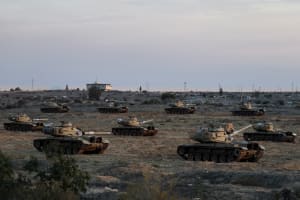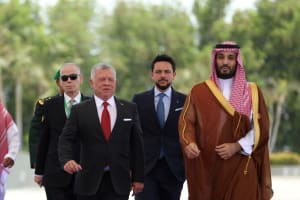Trump seeks deal with Iran, denies US and Israel planning strike on nuclear facilities

U.S. President Donald Trump on Wednesday denied that Washington and Jerusalem were planning a military strike on Iran’s nuclear facilities. However, the president emphasized that he would not permit the Iranian ayatollah regime to acquire a nuclear weapon.
“I want Iran to be a great and successful Country, but one that cannot have a Nuclear Weapon. Reports that the United States, working in conjunction with Israel, is going to blow Iran into smithereens, ARE GREATLY EXAGGERATED,” Trump stated in a post on his Truth Social platform.
While keeping all options on the table, Trump stressed that he prefers a diplomatic solution and workable deal to the Iranian nuclear crisis.
“I would much prefer a Verified Nuclear Peace Agreement, which will let Iran peacefully grow and prosper,” he wrote. “We should start working on it immediately, and have a big Middle East Celebration when it is signed and completed. God Bless the Middle East!” he added.
Trump’s statement came as the president signed several executive orders, including one that demands “maximum pressure” on the Iranian regime to give up its ambitions to acquire nuclear weapons and stop financing terrorism in the Middle East and elsewhere.
The executive order on Iran states that Tehran’s nuclear program “poses an existential danger to the United States.” The order warns that given the actions taken by the Iranian “revolutionary theocracy,” it is “in the national interest to impose maximum pressure on the Iranian regime to end its nuclear threat, curtail its ballistic missile program, and stop its support for terrorist groups.”
Trump rejected the notion that the Iranian regime is weak.
“They’re not weak. They’re very strong right now, and we’re not going to allow them to have a nuclear weapon,” Trump vowed during a joint press conference with Israeli Prime Minister Benjamin Netanyahu in Washington. “I signed a very strong proclamation,” Trump continued. “Doesn’t mean they won’t be weak [in the future].”
In December, Trump’s transition team reportedly discussed potential preventive military strikes on Iran’s nuclear facilities if diplomacy fails to prevent Tehran from acquiring nuclear weapons. While Trump is known to prefer non-military solutions, he admitted at the time that “anything can happen.”
“It’s a very volatile situation,” Trump said in an interview with Time Magazine.
The Iranian regime is believed to be at the threshold of developing nuclear weapons. A December report from the Office of the U.S. Director of National Intelligence (DNI) revealed, “Iran now has enough fissile material to make more than a dozen nuclear weapons."
Meanwhile, Iranian Foreign Minister Abbas Araghchi responded by claiming that Trump’s “maximum pressure” on Iran would end in “failure.”
“I believe that maximum pressure is a failed experiment and trying it again will turn into another failure,” Aragchi stated, referring to a similar policy advocated by Trump during his first presidency.
“If the main issue is that Iran does not pursue nuclear weapons, it is achievable and is not much of a problem,” Araghchi argued, repeating Tehran’s claim that its nuclear program is peaceful, and it does not seek nuclear weapons.
Despite this claim, Western powers and Israel have pointed to the fact that Iran does not need weapons-grade uranium for civilian nuclear facilities. In addition, the regime has systematically obstructed international efforts to inspect its covert nuclear facilities.
Iranian President Masoud Pezeshkian, who reportedly seeks improved ties with the West, also dismissed the Trump administration’s sanctions on the Tehran regime.
“America threatens new sanctions, but Iran is a powerful and resource-rich country that can navigate challenges by managing its resources,” Pezeshkian said.
However, the Iranian regime is currently weakened due to the severe degradation of its terror proxies, Hamas and Hezbollah, as well as the fall of its allied Assad regime in Syria.
Furthermore, the Israeli Air Force reportedly eliminated much of Iran’s aerial defenses and missile production capabilities during a large aerial strike on Iran last Oct. 26, which served as a response to Iran’s large missile attack on the Jewish state on Oct. 1.
The ayatollah regime is facing growing domestic opposition amid a weak economy.

The All Israel News Staff is a team of journalists in Israel.













